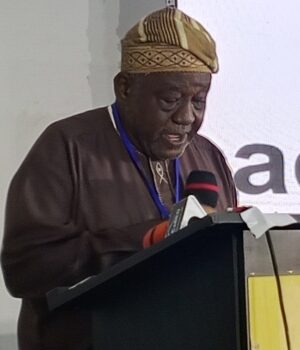BY ANTHONY OMOH
Professor Bamidele Badejo has warned that Nigeria risks national paralysis if urgent transport infrastructure reform is not implemented to reverse years of neglect, policy inconsistency, and poor planning.
The Lagos State University transport scholar, who delivered the keynote lecture at the 2025 Transport Infrastructure Summit in Lagos, described the sector as the heartbeat of national existence that has been left to fail.
“Imagine what it would mean if, for one day, all means of transportation grind to a halt. It would be a temporary death of existence,” Badejo said.
He noted that transportation is not only an economic function but also the foundation of social stability and national security.
Without efficient mobility, he said, workers, emergency services, and trade cannot function. The impact of recurring fuel crises, traffic gridlock, and infrastructure decay already shows how fragile Nigeria’s system has become.
Urgent Transport Infrastructure Reform Needed
Badejo outlined a grim picture of neglect, poor maintenance, and insecurity. He said Nigeria’s roads are riddled with potholes, while pedestrian facilities and freight systems remain underdeveloped. The result, he added, is a fragmented and uncoordinated transport ecosystem dependent on informal operators.
According to him, the rise of okada, korope, and tricycle operations reflects policy failure rather than innovation. Badejo identified twelve major barriers to transport infrastructure reform, including poor funding, weak technical capacity, proliferation of agencies, and indiscipline across the sector.
“The transport industry is labour-intensive but dominated by unskilled workers. Many are qualified by experience, not by training,” he explained.
He proposed a new framework anchored on four pillars: integrated land-use and mobility planning, institutional restructuring, investment in infrastructure renewal, and a culture of maintenance and innovation. He emphasized that future planning must be data-driven, inclusive, and aligned with population growth and urbanisation trends.
Despite the grim outlook, Badejo believes there is hope. He said the path forward lies in strategic public-private partnerships, green investments, and cleaner mobility technologies. He stressed that transport infrastructure reform should focus on renewable energy, smart infrastructure, and digital mobility tools to meet global standards.
Badejo urged subnational governments to develop state-owned transport corporations, especially rail and waterways authorities, to complement federal initiatives. He noted that decentralisation would make transport systems more responsive and efficient.
“Nigeria’s advantage lies in its ability to leapfrog older technologies, just as it did with mobile telephony. The opportunities in transport digitization, renewable energy, and the blue economy are vast,” he said.
He called on policymakers to see transport not as a privilege but as a necessity that sustains national life. Badejo urged the government to implement a unified transport policy backed by adequate funding, discipline, and collaboration among stakeholders.
“Transportation is life. It must be managed as a life-sustaining system, not a political project,” he said.
He also appealed for public attitudinal change towards maintenance, adding that without reform, Nigeria’s transport system will continue to hold the economy hostage.
“We must begin to act differently. Without transport infrastructure reform, Nigeria’s transport system will continue to hold the economy hostage,” Badejo warned again, stressing that the success of transport infrastructure reform depends on political will and collective action from both citizens and institutions.
Badejo concluded by urging leaders to prioritise sustainability, innovation, and discipline as the foundation for national transformation. He said if these principles guide reform, Nigeria could rebuild its transport backbone and secure lasting mobility for generations to come.























